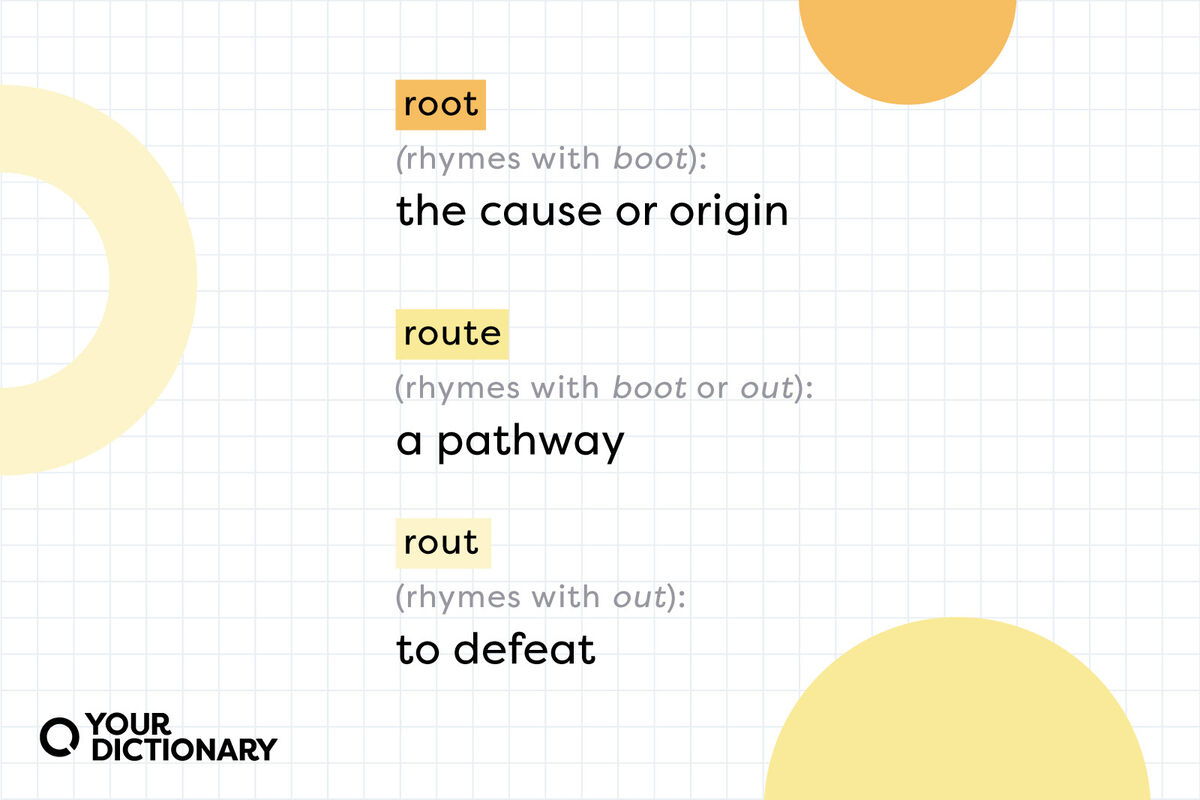
Root vs. route is the root of many grammar mistakes. Now add in rout (and router), and you’re taking a quick route to a bad headache. Don't let these words rout you; it's not too hard to route their vocabulary roots. (We couldn’t resist.)
Meaning of “Root”: The Cause or Source
Root (rhymes with boot) means “the cause or source of something.” It functions as a noun most of the time but also has a verb form and an adjective form.
How To Use “Root” as a Noun
The noun form of root comes from the Latin radix and the Old English rōt, meaning “origin.” Root can relate to the underground system of roots that sustain a plant, or the underlying issue of a problem. It can also mean “to plant firmly” in idioms like take root. For example:
- The tree roots took in water from the soil to help the tree grow tall.
- Your negativity is the root of our marriage problems.
How To Use “Root” as a Verb
As a verb, root has a few different meanings. From the Middle English wroten, to root means “dig” — either literally (such as pigs rooting for truffles) or figuratively (such as a person rooting for information).
Additionally, it can mean “to cheer for” a team or a person (from an obsolete meaning “to work hard”). For example:
- The young pig learned to root in the soil for delicious truffles.
- Maya spent the conversation rooting for information about her crush.
- I always root for the local team, no matter how well they’re doing.
How To Use “Root” as an Adjective or Participial Adjective
When used as an adjective, root means “pertaining to a root.” It can also be a participial adjective (rooted) to describe something planted deeply. For example:
- The dentist says I need a root canal before the end of the year.
- Root vegetables are a good source of vitamins.
- Harold’s fears, rooted in his experiences with rejection, kept him from finding a relationship.
Meaning of “Route”: A Pathway
Route means “a path to follow.” It’s often confused with root because of their pronunciations, which are the same in the United Kingdom, France, and even many parts of the United States. In some areas of the U.S., however, route is pronounced “rowt” (rhyming with out).
Using “Route” as a Noun
Using route to describe a pathway comes from the Old French rute and Latin ruptus, which mean “a road broken open” — similar to ruptured.
It appears in several common colloquialisms, such as paper route (the path you follow to deliver newspapers), escape route (the path you take to escape), and en route (a French expression for “on the way”).
- Follow this route if you want to arrive at your destination on time.
- Route 66 is a wonderfully scenic drive.
- My brother wakes up at 5 a.m. to start his paper route.
Using “Route” as a Verb
The verb form of route means “to set a route” or “to send in a direction.” For example:
- Can you route electricity through this wall?
- After we moved, the post office routed our mail to our new address.
- My electronic navigation device re-routed me when I ran into traffic.
Meaning of “Rout”: To Defeat
Now here’s where it gets confusing. Rout doesn’t come from the French rute; it comes from the French déroute, meaning “a disorderly group of soldiers.”
It’s always pronounced “rowt,” and when written in a verb form, it’s a homonym with route — but instead of “a path,” it means “to cause someone to retreat” or “to defeat soundly.”
When To Use “Rout” as a Verb
Unlike root and route, rout is most commonly used as a verb. For example:
- The rival football team may rout our team by the end of the first half.
- Thousands of citizens were routed from their homes when enemy troops arrived in their town.
- Once the election results were in, the defeated president knew he’d been routed.
When To Use “Rout” as a Noun
You can also use rout as a noun when referring to a defeat — or, in an older sense, a group of people who defeat others. For example:
- We turned off the game when we realized it would be a rout.
- There’s no way I’m playing chess with you again; last time was a rout!
- The rout of soldiers overthrew their general in a shocking display of mutiny.
What About “Router”?
The word router and its pronunciation is another source of confusion. It refers to two things:
- a computer networking device (a wireless router)
- a woodworking tool (a wood router)
When referring to the networking device, router comes from the word route (because it routes computer data into different directions). It has two different pronunciations: “ROW-ter” in American English, “ROO-ter” in British English.
But when router describes the wood tool (which cuts wood away from a main piece of wood), it’s pronounced “ROW-ter” everywhere because it comes from rout — “to destroy.”
Tips for Remembering the Difference Between “Root,” “Route,” and “Rout”
If you’ve made it this far, use these tips the next time you’re stuck between root vs. route (and rout):
- Root looks and sounds like boot — don’t trip over the root with your boot.
- Route has an “e,” just like explore — you should explore new routes.
- Rout looks and sounds like pout — experiencing a rout would make someone pout.